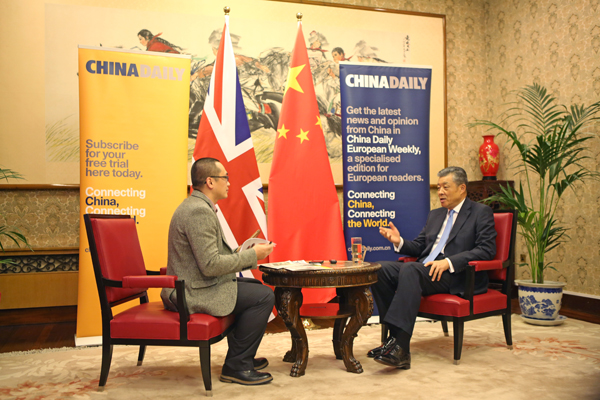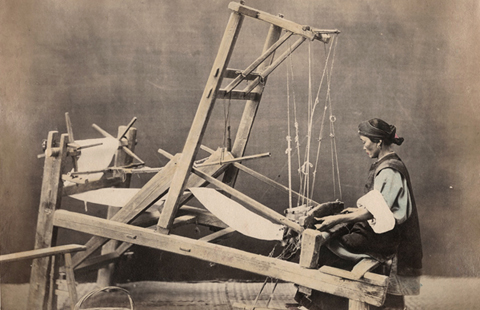Ambassador Liu Xiaoming's interview with the China Daily
?
 |
|
Liu Xiaoming, Chinese?ambassador to the UK,?receives an interview with China Daily in the Chinese Embassy?in London, UK, February 3,2017.[Brett Dietrich/China Daily]?? |
China Daily: It has now been just over a year since President Xi Jinping and the then Prime Minister, David Cameron, declared a new golden era for China-UK relations. In your view, what is the state of play now, and in which area has the most progress been made?
Ambassador Liu: In 2015, President Xi Jinping paid a “Super State Visit” to the UK, during which China and Britain announced that the two countries would start a golden era and build a global comprehensive strategic partnership for the 21st century. In addition, 59 outcomes were reached and 40 billion pound of cooperation agreements were signed.
2016 was the opening year of the “Golden Era” of China-UK relations. It was an important year for both countries to follow through the outcomes of the state visit. With the concerted efforts of both sides, China and the UK overcame the uncertainties following the Breixt Referendum, steadied the relations in time of transition and maintained the growing momentum of bilateral ties.
President Xi Jinping and Prime Minister May met in Hangzhou at the G20 Summit. The two leaders reaffirmed their shared commitment to the “Golden Era” of China-UK relations and to building a global comprehensive strategic partnership for the 21st century.
The three high-level dialogues between China and Britain - Economic and Financial, People to People and Strategic, were successfully held. China and the UK also co-hosted the first and successful High Level Security Dialogue.
China-UK cooperation in trade and investment was also making headway. We established the Regional Cooperation Joint Working Group, the first of its kind between China and a European country.
There are also a number of highlights in other fields, such as bonds, securities, insurance, and green finance. We started to issue two-year multi-entry visas to each other’s nationals, which further facilitated mutual visits. What was particularly notable was the Hinkley Point C nuclear project. This “golden fruit” of the state visit had its final package deal signed in September 2016, which was a new milestone for the result-oriented cooperation between China and the UK.
Building the “Golden Era” of China-UK relations is a long-term strategic vision of the leaders of our two countries. It is in the interests of both sides. It is in line with the trend of the times and it meets the expectation in both countries for closer exchanges and cooperation.
2017 is a year for consolidating the “Golden Era”. It also marks the 45th anniversary of the ambassadorial relations between China and the UK. China-UK relationship is now at a historical moment. It is time to lock in what’s been achieved and seek further progress. There are huge potential to be tapped and bright prospects for cooperation.
This calls on both countries to maintain the momentum of high-level exchanges, to dovetail our respective development strategies, and to turn the opportunities of “Belt and Road” into new flagship projects. We will further expand cooperation in trade, investment, energy, infrastructure, finance, innovation, etc. We will also expand cultural and people-to-people exchanges. We will strengthen coordination and cooperation in international affairs and manage our differences properly. We will make all-round efforts to ensure the healthy and steady growth of China-UK relations.
China Daily: If we can now turn to Brexit. It seems certain that Britain will leave the EU, barring any last minute legal or parliamentary hitches. What is China’s broad position on the UK’s pending departure from the EU?
Ambassador Liu: According to Prime Minister May, the UK will trigger Article 50 before the end of March. That will be a significant move for Britain, Europe and the world.
China’s position on this has been consistent. We respect the choice of the British people. We respect Britain’s independent choice of its own development path. And we hope the UK and the EU will, through consultation and negotiation, reach an early arrangement that is acceptable to both sides.
Since the Brexit Referendum last June, views on the future of Brexit negotiation have been across the spectrum, many of which are quite pessimistic. I am an optimist, and I believe when there is a problem, there is always a solution.
Brexit does not mean the UK leaving the Europe. The inseparable relationship between Britain and Europe is historical. Such relationship is also built upon the close cooperation in all fields including politics, economy, culture and security. The consensus, that a stable and prosperous UK and EU is best for all, also serves as the basis for the steady transition of Britain-Europe relations. I hope the two sides will meet each other half way and reach a win-win agreement so as to achieve development together.
Both the UK and the EU are influential forces in the international arena. Both are important partners for China in strategic, political or business sense. Brexit will not affect China’s confidence in growing its ties with the UK and the EU. In 2016, the “Golden Era” of China-UK relations survived the Brexit Referendum and continued to grow, and China and the EU also held the 18th China-EU Summit.
As I mentioned just now, the three high-level dialogues between China and the UK have been successively held and produced positive results. Chinese business enthusiasm for investing Britain and the EU remain unaffected and strong. Recent statistics show that China’s investment in Europe as a whole increased by 76% in 2016, and China’s direct investment in UK’s non-financial sectors from January to November last year exceeded 1 billion US dollars. These showed parallel progress in both China-UK and China-EU relations.
In 2017, China stands ready to work with the UK and the EU to ensure that these ties will not only grow respectively but also reinforce each other. China is ready to join hands with the UK and the EU to work for the peace and development of the world.
China Daily: It is a well-known fact that some members of the EU are finding it difficult to accept China’s automatic rights to MES, and that this is standing in the way of Brussels signing a Free Trade Agreement with China. The UK, on the other hand, has made it clear that it stands by China’s automatic right to MES 15 years after the WTO deal. Do you think this gives the UK an edge in dealing with China over trade issues?
Ambassador Liu: Since its accession to the WTO 15 years ago, China has earnestly fulfilled its obligations under the WTO rules, being an active and resolute participant, upholder and contributor of the multilateral trading regime. President Xi Jinping, in his recent speech at the UN Office in Geneva, emphasized the importance of upholding WTO rules, supporting an open, transparent, inclusive and nondiscriminatory multilateral trading regime and building an open world economy.
The spirit of the contract is the foundation of the market economy, and adherence to international treaties is one of the basic norms of the international law. All WTO members are obliged to ensure honest contractual performance and to uphold the authority of the multilateral trading regime, which in turn serves the interests of the members themselves.
“Pacta Sunt Servanda”. This is one of the most fundamental principles of the international law. Regrettably, the US, the EU and a few other WTO members have so far refused to fulfill their obligations under Article 15 of the Protocol on China’s Accession to the WTO. The EU has gone further, intending to replace “non-market economy” criteria with “market distortion” criteria. Such attempts to renege on international treaty obligations and continue the “substitute nation” approach are in essence protectionism. They not only jeopardize the mutual trust and cooperation between WTO members but also undermine the international confidence in the multilateral trading regime and rules.
China sincerely hopes for win-win cooperation with the EU. We hope that the EU will look at China’s development in an objective manner and pave the way for cooperation. China has launched the WTO dispute settlement procedure by requesting a consultation with the EU on Article 15. We hope the EU will work with China.
The issue of Article 15 not only bears on China’s interests and China’s overall business cooperation with the EU. It is a test of whether the international trade rules can be strictly implemented. In fact, trade involved in anti-dumping cases accounts for only a small share of China-EU trade. But how to handle anti-dumping is question of whether the EU abides by the international rules and treaties. We hope the EU will join hands with China and take concrete actions to oppose protectionism and uphold the multilateral trade regime and rules.
The UK has long been a supporter and advocate for free trade. We are pleased to see that at the eighth China-UK Strategic Dialogue in December last year, the UK pledged to strengthen trade cooperation with China and jointly respond to global challenges.
China is Britain’s second largest trading partner outside the EU while the UK is the largest destination in Europe for Chinese investment. Our trade and investment cooperation has been advancing steadily. Both countries are now committed to concrete improvements in reciprocal market access and a transparent and predictable level playing field for each other’s businesses. We will work together to maintain the dynamics of our business cooperation.
At present, since the UK is still an important EU member, we hope the UK will continue to play its role in ensuring the EU’s complete and thorough fulfillment of the obligation under Article 15.
China Daily: In terms of Chinese investment, it looks as if it will be harder for Chinese firms to invest in the US under a Trump Administration. In addition, trade relations with the EU are far from ideal, to which I would say the UK is an obvious destination for Chinese investment. Would you agree that Britain has a need, while China has the means?
Ambassador Liu: At Present, the world economic growth is sluggish while the after-effects of the financial crisis is still lingering. The development gap between different countries keeps widening. Some countries attributed this problem to globalization and this has led to the rise of protectionism.
In his recent speech in Davos, President Xi Jinping gave his answer. He said: “Whether you like it or not, the global economy is the big ocean that you cannot escape from. Any attempt to cut off the flow of capital, technologies, products, industries and people between economies, and channel the waters in the ocean back into isolated lakes and creeks is simply not possible. Indeed, it runs counter to the historical trend.”
He also said: “Pursuing protectionism is like locking oneself in a dark room. While wind and rain may be kept outside, that dark room will also block light and air. No one will emerge as a winner in a trade war.”
I have also noted Prime Minister May’s speech at the Davos Forum, in which she said that “Britain is and will always be open for business”. In her recent interview with the Financial Times, she said she intended to visit China “relatively soon” to shore up Britain’s trading arrangements with China.
With regard to what you said “Britain has a need, while China has the means”, I think this description is to some extent an over simplification because it does not cover all the aspects of China-UK cooperation.
China and the UK are the world’s second and fifth largest economies. China and Britain have respective strengths and mutual needs. There is therefore a huge potential for the two to cooperate.
The UK has strong hi-tech and financial sectors and creative industry, and it is good at brand building and promotion. China has an edge in manpower, market, economic output, financing, new energy and high-speed rail. There is much the two countries can offer each other as they pursue their respective development strategy. That’s why China and the UK have every reason to work even closer and build a win-win partnership.
The Hinkley Point C nuclear project is such a case in point. This is the largest single investment that China has ever made in the UK and indeed in the whole of Europe. It will create over 25,000 jobs. I am pleased to hear the recent announcement by the UK government to start the generic design assessment of China’s nuclear reactor HPR1000. The UK needs reliable energy supply while China has the technology and capital. This makes win-win cooperation between our two countries possible.
The two countries are also working actively to dovetail China’s “Belt and Road” Initiative and “Made in China 2025” with Britain’s “Northern Powerhouse” and “UK Industry 2050”. The areas that offer the most opportunities for cooperation are green energy, high speed rail, airport and other infrastructure building. Cooperation in these areas will help put two-way investment and trade arrangement at a higher level.
Today, the UK is the largest destination in Europe for Chinese investment. I hope that the UK will continue to adopt a pragmatic approach, keep its doors open to Chinese businesses, and ensure a level-playing field for businesses from China. Chinese companies are enthusiastic for stronger and win-win cooperation with UK partners. We believe that in the new year, bilateral investment and trade between China and the UK will meet with greater success.
The “Belt and Road” Initiative I mentioned just now offers a broad platform for Chinese and British companies to explore the market of a third country. In this sense, I think it is more proper to say that “the world has the need, while China and Britain have the opportunity”.
The UK has many advantages in the “Belt and Road” cooperation. It has a long history of market economy. It has strong financial and service sectors. It has a sound legal system and abundant legal professional resources.
From the government to businesses, from think tanks to media, the whole country of Britain has great enthusiasm for the “Belt and Road” initiative. The UK was the first among major western countries to apply to join the Asian Infrastructure Investment Bank. It was the second only after China to inject capital into the AIIB. I look forward to the sound cooperation between China and the UK in the building of the “Belt and Road”.
China Daily: I have always been interested in international relations, in particular the role of the UN. As China and Britain are permanent members of the Security Council, do you see any area in which the two countries can work together to solve any of the world’s outstanding issues?
Ambassador Liu: President Xi Jinping pointed out in his recent speech at the UN Office in Geneva that “China remains unchanged in its commitment to multilateralism”. “China will firmly uphold the international system with the UN as its core, the basic norms governing international relations embodied in the purposes and principles of the UN Charter, the authority and stature of the UN, and UN’s core role in international affairs.”
Both China and the UK are the founding members of the UN and permanent members of its Security Council. We have had sound cooperation in the UN across the board. We have played important roles in jointly upholding world peace, advancing common development and enhancing international cooperation.
Take for example the Iranian nuclear issue. China and the UK, together with the other three of the P5 and Germany, worked for years with Iran and negotiated the Iran Nuclear Agreement, which effectively safeguarded the international non-proliferation regime and the peace and stability of the Middle East.
Another example is peacekeeping. China and the UK have maintained close coordination in the Security Council over the planning and deployment of UN peacekeeping missions, and cooperated at the same time on training programmes.
Our two countries have also worked together to advance the implementation of the 2030 Agenda for Sustainable Development and to push for the joint global responses to climate change. We have had smooth communication and close coordination over major issues that bear on global security and development.
On Syria, Chinese Foreign Minister and the UK Foreign Secretary issued a joint statement early shortly after New Year’s Day last year. Foreign Minister Wang Yi came to London the following month for the Syria Donors Conference and the Chinese Government’s Special Envoy for the Syrian issue Xie Xiaoyan visited Britain last October.
Both China and Britain support a political resolution of the Syrian issue. Both countries pay close attention to the humanitarian situation in Syria and advocate for unity and cooperation in the Security Council and an early resolution of this issue.
At the China-UK Strategic Dialogue last December, China and the UK also issued a joint statement on Afghanistan.
During President Xi’s state visit to the UK in 2015, our two countries announced the building of the China-UK global comprehensive strategic partnership for the 21st century. Making joint efforts to solve key global issues is an important part of building such a partnership in the “Golden Era” of China-UK relations.
China stands ready to enhance the communication and cooperation with the UK so as to join forces in enhancing the wellbeing of humanity, building a community of shared future for mankind and contributing to the peace and development of the world.
China Daily: I believe you have had a broad experience of western culture - are you surprised by how readily UK audiences are adapting to the various Chinese events that have been staged under the cultural banner?
Ambassador Liu: I think there are many reasons for the popularity of Chinese culture in Britain.
First, there is no shortage of cultural similarities. Culturally, China and Britain are both influential in the world, given our rich history and profound heritage. Both have made remarkable contribution to the progress of human civilizations. This serves as the solid foundation for cultural exchanges between China and the UK.
Second, the ever deepening China-UK cultural exchanges enable our peoples to gain closer mutual understanding and appreciation of each other’s culture.
Historically, trade between China and Britain helped spread Chinese culture to this country. Since the establishment of diplomatic ties, the cultural exchanges between our two countries have boomed, growing both in width and depth. In recent years, thanks to the strong support of both governments and the enormous enthusiasm of peoples, cultural exchanges and cooperation between China and Britain have leapfrogged. Cultural ties have now become a pillar and a new growth point of China-UK relationship.
Third, the similarity in ideas and the willingness to learn from each other bestow broad prospects on China-UK cultural cooperation. Both Chinese and British cultures are open, inclusive and adaptive. Both countries are working hard to build a culturally strong country. China and Britain can achieve win-win cooperation by drawing strength from each other in a wide range of aspects, such as creative art, reviews and critics, art management and administration, market promotion, financing, etc.
Thanks to our concerted efforts over the years, remarkable progress has been achieved in our cultural exchanges and cooperation. These achievements have helped build trust and deepen cooperation between China and Britain.
British literature, art, films and TV shows have a large number of fans in China. China’s Spring Festival, together with its traditional, modern and contemporary arts and culture, is gaining popularity in Britain.
Notably in 2016, our two countries co-hosted a series of activities to commemorate the 400th anniversary of the passing of Tang Xianzu and William Shakespeare. Events and shows in Britain by Chinese art groups attracted nearly 30,000 audiences and started an unprecedented wave of enthusiasm for Chinese drama and culture.
China and the UK are also making rapid progress in their cooperation in the creativity industry. After signing the landmark film co-production agreement in 2014, our two countries also signed a deal to co-produce TV programmes.
Other areas such as football, films and publications are also seeing flourishing cooperation between China and the UK in the forms of mutual investment, joint investment and joint creation. They all point to the fact that there are broad prospects for China-UK cooperation in the creativity industry.
























